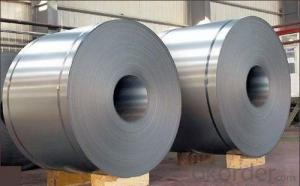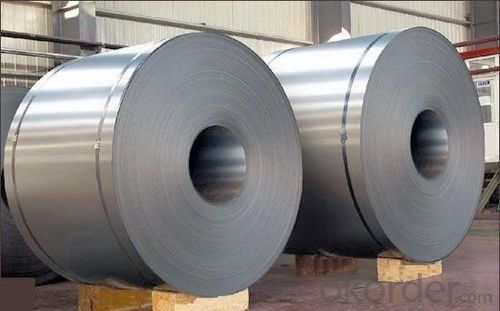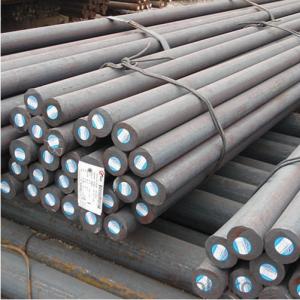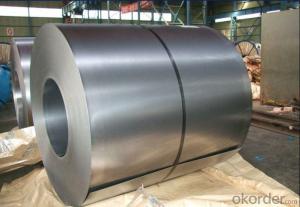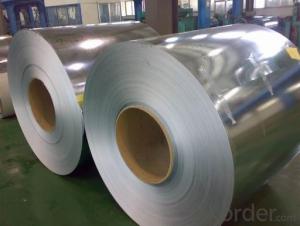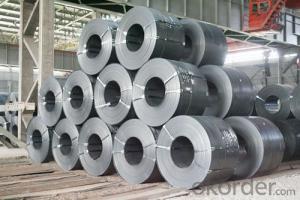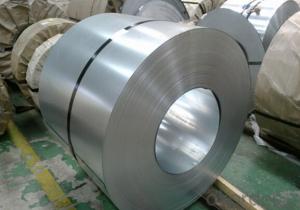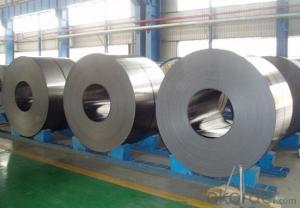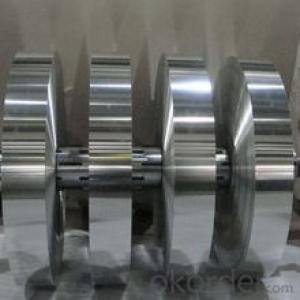Grade Q450NQR1 Corten Steel Coil 4.0*1050*C
- Loading Port:
- Shanghai
- Payment Terms:
- TT or LC
- Min Order Qty:
- 100 m.t
- Supply Capability:
- 20000 m.t/month
OKorder Service Pledge
OKorder Financial Service
You Might Also Like
Grade Q450NQR1 Corten Steel Coil 4.0*1050*C
Description:
-Grade: Q450NQR1
-Specification: 4.0*1050 in coil
Chemical Composition(%) of Grade Q450NQR1 Corten Steel Coil 4.0*1050*C:
| C | Si | Mn | P | S | Cu | Ti/V | Cr | Ni | RE |
| ≤0.12 | ≤0.75 | ≤1.50 | ≤0.025 | ≤0.008 | 0.20~0.55 | / | 0.30~1.25 | 0.12~0.65 | / |
Mechanical Properties of Grade Q450NQR1 Corten Steel Coil 4.0*1050*C:
| Thickness(mm) | Y.S(MPa) | T.S(MPa) | EL. A5% | Bend 180o | Impact Test | |
| oC | AKV J | |||||
| ≤6 | ≥450 | ≥550 | ≥20 | d=a | -40 | ≥60 |
| 6~14 | d=2a | |||||
| >14 | d=3a | |||||
Application of Grade Q450NQR1 Corten Steel Coil 4.0*1050*C:
Used in different weather. It has good anti rust protection and welding ability and is used in shipping container,support frame of outside building etc. Remarkably enhances the anti-corrosive performance of the structural element, lengthens the structural element service life, uses in manufacturing each kind of structural element which was used under the atmospheric envirenment and the caustic gas, the liquid envirenment.
Payment:
-Invoicing on theoretical weight or actual weight as customer’s request.
-FOB, CFR or CIF.
-Regular terms of payment:
1, 30% payment in advance, the remaining balance (70% payment) against the copy of B/L.
2, 30% payment in advance, the remaining balance (70% L/C) against the copy of B/L.
3, Negotiable.
-The payment terms will be written in contraction detailedly.
FAQ:
Q1: Why buy Materials & Equipment from OKorder.com?
A1: All products offered byOKorder.com are carefully selected from China's most reliable manufacturing enterprises. Through its ISO certifications, OKorder.com adheres to the highest standards and a commitment to supply chain safety and customer satisfaction.
Q2: How do we guarantee the quality of our products?
A2: We have established an advanced quality management system which conducts strict quality tests at every step, from raw materials to the final product. At the same time, we provide extensive follow-up service assurances as required.
Q3: How soon can we receive the product after purchase?
A3: Within three days of placing an order, we will arrange production. The shipping date is dependent upon the quatity, how many sizes you want and the plan of production, but is typically 1 month to 2 month days from the beginning of production.
Images of Grade Q450NQR1 Corten Steel Coil 4.0*1050*C:
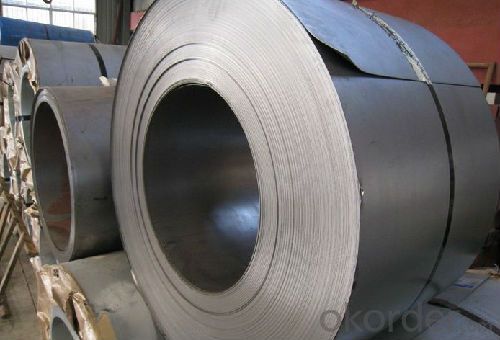
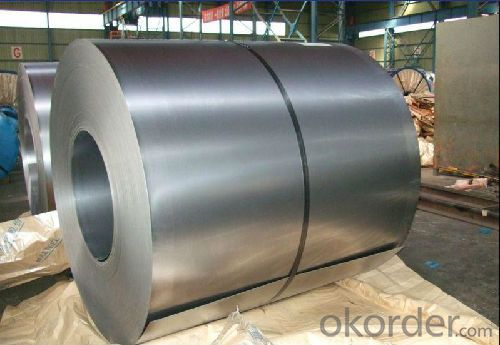
*If you would like to get our price, please inform us the size, standard/material and quantity. Thank you very much for your attention.
- Q: What are the different galvanizing techniques used for special steel?
- There are several galvanizing techniques used for special steel, each with its own advantages and considerations. Some common techniques include hot-dip galvanizing, electro-galvanizing, and mechanical galvanizing. Hot-dip galvanizing involves immersing the steel in a bath of molten zinc, creating a thick, durable coating. Electro-galvanizing uses an electric current to deposit a thin layer of zinc onto the steel surface. Mechanical galvanizing, also known as centrifuge galvanizing, uses centrifugal force to apply a zinc coating. Each technique has its own specific applications and benefits, depending on factors such as the desired thickness of the coating, the complexity of the steel structure, and the intended use of the galvanized steel.
- Q: How does special steel behave under different types of loading conditions?
- Special steel, also known as alloy steel, exhibits unique behavior under different types of loading conditions. It is specifically designed to possess exceptional mechanical properties, making it suitable for a wide range of applications where high strength, toughness, and resistance to wear or corrosion are required. Under tension loading, special steel demonstrates excellent tensile strength and ductility, enabling it to withstand pulling forces without easily fracturing. This property makes it ideal for applications where components are subjected to pulling or stretching forces, such as cables, structural elements, or automotive parts. When subjected to compressive loading, special steel showcases its exceptional compressive strength, allowing it to withstand forces that tend to squeeze or press it together. This makes it suitable for applications like hydraulic cylinders, crankshafts, or flanges, where resistance to compression is crucial. In terms of bending or flexural loading, special steel exhibits remarkable flexibility without losing its strength, enabling it to withstand repeated bending without deformation or failure. This property is particularly useful in applications involving springs, suspension systems, or beams subjected to dynamic loads. Special steel also demonstrates excellent fatigue resistance, which means it can withstand cyclic loading or repeated stress without failure. This property is crucial in applications subjected to continuous or repetitive loading, such as turbine blades, gears, or axles. Moreover, special steel can effectively handle impact loading, as it possesses high toughness and impact resistance. This makes it suitable for applications where sudden shocks or impacts are expected, such as hammer heads, drill bits, or armor plating. In terms of temperature loading, special steel retains its mechanical properties even at high temperatures due to its excellent heat resistance. This property makes it suitable for applications exposed to extreme heat or thermal cycling, such as turbine components, exhaust systems, or molds used in metal casting. In summary, special steel behaves differently under various loading conditions, adapting its mechanical properties to meet the specific requirements of each application. Its unique combination of strength, toughness, ductility, and resistance to wear or corrosion make it a versatile material capable of withstanding different types of loading conditions.
- Q: What are the different surface hardening techniques for special steel parts?
- Some of the different surface hardening techniques for special steel parts include case hardening, nitriding, carburizing, induction hardening, and flame hardening.
- Q: How is corrosion-resistant alloy steel used in the production of chemical processing equipment?
- Corrosion-resistant alloy steel is used in the production of chemical processing equipment due to its ability to withstand the harsh chemical environments and resist corrosion. It is commonly used to manufacture pipes, tanks, valves, and other components that come into contact with corrosive substances. This type of steel helps ensure the longevity and reliability of the equipment, preventing leaks, contamination, and costly repairs or replacements.
- Q: What are the main advantages of using special steel in the defense industry?
- The main advantages of using special steel in the defense industry are its exceptional strength, durability, and resistance to extreme conditions. Special steel can withstand high impact and provide superior protection against ballistic threats, making it ideal for armored vehicles, tanks, and military aircraft. Additionally, its corrosion resistance ensures longevity and reduces maintenance requirements. Special steel also offers versatility in terms of design and customization, allowing for the development of advanced weaponry and equipment.
- Q: What are the main applications of special steel in the packaging industry?
- Special steel is widely used in the packaging industry for a range of applications. One of the main uses is in the manufacturing of packaging machinery, such as filling machines, sealing machines, and wrapping machines, where the high strength and durability of special steel components ensure smooth operation and longevity. Additionally, special steel is utilized for the production of packaging tools, like cutters, blades, and molds, which require resistance to wear and corrosion. The use of special steel in the packaging industry helps to enhance productivity, improve product quality, and ensure the safety and integrity of packaged goods.
- Q: How is free-cutting steel used in the manufacturing of screws and bolts?
- Free-cutting steel is commonly used in the manufacturing of screws and bolts due to its excellent machinability. The steel's composition includes additives such as sulfur, lead, or bismuth, which act as lubricants during the machining process, making it easier to cut and shape the material. This results in a faster and more efficient production of screws and bolts, reducing manufacturing time and costs.
- Q: What are the main characteristics of creep-resistant steel forgings?
- Creep-resistant steel forgings possess several key characteristics that make them suitable for high-temperature applications where the material is exposed to prolonged stress and heat. Firstly, creep-resistant steel forgings are known for their excellent resistance to creep deformation. Creep is the gradual deformation that occurs under constant load and elevated temperatures over an extended period. These forgings are designed to resist this deformation and maintain their shape and structural integrity, making them ideal for applications such as turbine blades, boiler components, and other high-temperature environments. Another important characteristic of creep-resistant steel forgings is their high strength. These forgings are manufactured using alloying elements like chromium, molybdenum, and vanadium, which enhance the material's tensile strength and provide excellent resistance to deformation and fracture under high-stress conditions. This strength is crucial in ensuring the forgings can withstand the demands of the application and perform reliably over time. Additionally, creep-resistant steel forgings exhibit good oxidation and corrosion resistance. The alloying elements provide a protective layer on the surface of the forgings, preventing oxidation and corrosion at high temperatures. This resistance is vital in preventing degradation of the material and maintaining its mechanical properties, even in harsh environments. Moreover, creep-resistant steel forgings offer excellent thermal stability. They can withstand extreme temperature variations without significant dimensional changes or loss of mechanical strength. This stability is crucial in applications where rapid heating and cooling cycles occur, ensuring the forgings can maintain their performance under challenging conditions. Furthermore, creep-resistant steel forgings have excellent fatigue resistance. Fatigue is the weakening of a material caused by cyclic loading, and it is particularly relevant in high-temperature applications due to the combination of stress and heat. These forgings are designed to withstand cyclic loading and maintain their mechanical properties, reducing the risk of fatigue failure and enhancing the overall reliability of the component. In summary, the main characteristics of creep-resistant steel forgings include resistance to creep deformation, high strength, good oxidation and corrosion resistance, thermal stability, and excellent fatigue resistance. These characteristics make creep-resistant steel forgings a reliable and durable choice for applications that require resistance to high temperatures, stress, and prolonged exposure to challenging environments.
- Q: What is the significance of alloying elements in special steel?
- The significance of alloying elements in special steel is that they enhance the properties and performance of the steel. These elements are added in varying proportions to achieve desired characteristics such as increased strength, improved corrosion resistance, enhanced hardness, better heat resistance, or increased toughness. Alloying elements also play a crucial role in controlling the grain structure, reducing brittleness, and improving the overall mechanical properties of the steel. Thus, alloying elements are essential in tailoring the steel's properties to meet specific industrial applications and requirements.
- Q: What are the different applications of stainless special steel?
- Stainless special steel finds various applications in industries like construction, automotive, aerospace, and medical. It is commonly used in the production of surgical instruments, chemical processing equipment, heat exchangers, and food processing machinery. Its corrosion resistance, strength, and ability to withstand high temperatures make it an ideal choice for applications where durability and hygiene are essential.
Send your message to us
Grade Q450NQR1 Corten Steel Coil 4.0*1050*C
- Loading Port:
- Shanghai
- Payment Terms:
- TT or LC
- Min Order Qty:
- 100 m.t
- Supply Capability:
- 20000 m.t/month
OKorder Service Pledge
OKorder Financial Service
Similar products
Hot products
Hot Searches
Related keywords
